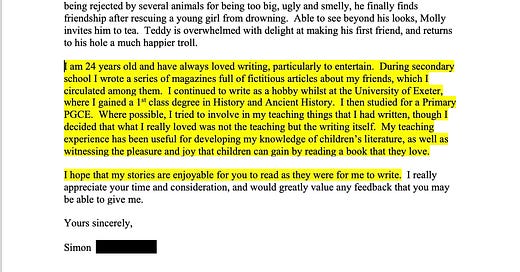Approaching Agents #4: What I did RIGHT
The change of approach that led me to securing representation
This series is all about my journey from first query to signing with my agent, Sallyanne Sweeney, in October 2013.
So far, I’ve shared:
Everything I submitted to (and received from) agents – my manuscripts, synopses, cover letters, rejections and offer
Today, I’m going to share what I did right – the decisions and changes I made that led to an offer of representation.
I reflected upon the rejections I received
Four months into my querying journey, and after 12 submissions but no offers, I decided that what I was doing wasn’t working, so I spent some time reflecting on the feedback I’d received, and analysing my manuscripts (which was long overdue).
Agents had commented that they were ‘not bowled over’ by my work, ‘unsure they could sell my book well’, and that my stories ‘didn’t quite stand out enough’.
Quite simply, I needed to do something different.
I think it was at this point that I realised I’d been trying to mimic other writers (unsuccessfully, of course) – which was perhaps the root of the problem.
How could my writing possibly stand out when it was a poor imitation of others’?
I mentioned in a previous post how reading the picture book Bear’s Big Bottom by Steve Smallman and Emma Yarlett proved a bit of a turning point. Its rhyme scheme was one I’d not encountered before, but I loved it so much that I decided to adopt it for a new story idea I had.
I may have copied the rhyme scheme, but the tone and voice of the text I wrote was, finally, my own – and distinctively my own, and a much better reflection of my personality and sense of humour than the previous texts I’d written.
That story came more naturally. It was much less forced. As a result, it was generally much stronger.
I persisted.
When I submitted my new text for the first time, I felt hopeful, and confident that I was on the right track.
That positivity evaporated the instant I received the agent’s reply, 48 hours later, in which she promptly rejected it. When hope and confidence disappeared, crushing disappointment, frustration and doubt immediately arrived to take their place.
I felt like giving up, and genuinely considered doing so.
But only for the briefest of moments.
Because I believed in those texts (for good reason, it would turn out – both were acquired by publishers, and I Really Want the Cake is one of my most commercially-successful books).
And because I remained mindful of the subjectiveness of opinions and the industry: my previous rejections – some of which had said as much, literally word-for-word – had drilled this in to me. This agent might not be able to see the visual potential of my text, but another one might, I thought.
That’s not to say I didn’t take this rejection personally. It absolutely wasn’t personal, of course. But, due to the intensity of my disappointment and frustration that this agent didn’t see the potential that I knew this text had, I took it as a slight on my ability – and, if I’m honest, consequently I adopted what can only be described as a ‘fuck you’ attitude.
I’m certainly not proud of that: it’s hardly a mature and measured response to rejection. But it undoubtedly fuelled me to keep trying. I wanted to prove that agent wrong, and myself right.
And the very next agent – Sallyanne – did see the potential in it – which proved, once again, just how subjective the industry is.
I re-wrote – and greatly improved – my cover letter
My previous post highlighted all that was wrong with my initial cover letter:
it featured synopses of the manuscripts that weren’t succinct enough
it was waffly and failed to get across my personality
it failed to demonstrate that I understood and had knowledge of the children’s book market
it contained mistakes - I hadn't proofread it well
it contained some clumsy, unnecessary and cringeworthy sentences
it (and my accompanying manuscripts) revealed my rush and overeagerness to acquire an agent
Here it is, just to remind you of its awfulness (with particularly terrible parts highlighted):
Keep reading with a 7-day free trial
Subscribe to Authorly Honest to keep reading this post and get 7 days of free access to the full post archives.




